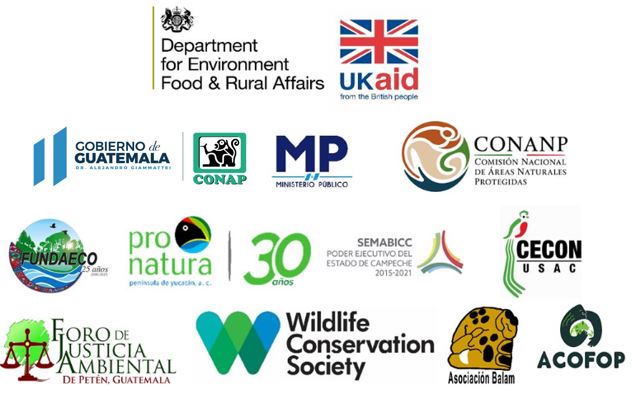For 31 months the project "Transboundary Coordination to Reduce Illegal Wildlife Trade in the Guatemala-Mexico Green Corridor" was implemented within the Guatemala-Mexico Green Corridor with the support of the Illegal Wildlife Trade Challenge Fund of the United Kingdom (IWTCF). The Wildlife Conservation Society (WCS) and multiple national partners were able to strengthen awareness about IWT and increase national capacities of institutions responsible for the conservation and protection of flora and fauna, as well as implementing alternative livelihoods projects in partnership with rural communities exposed to IWT within the Selva Maya’s Guatemala-Mexico Green Corridor, including within Guatemala and Mexico.
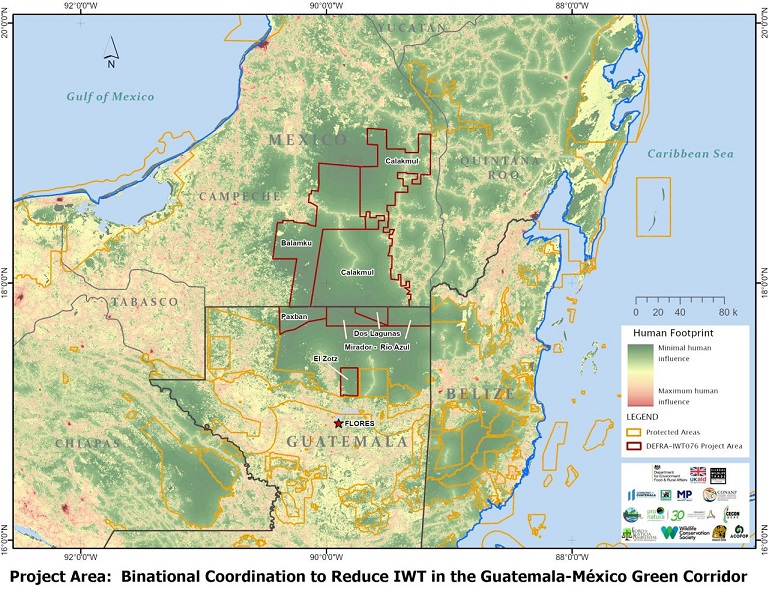 The areas covered by the project in Guatemala included: Mirador-Río Azul National Park, the Naachtún-Dos Lagunas Biotope and the El Zotz Protected Biotope, in addition to the Paxbán management unit, in the Maya Biosphere Reserve’s (MBR) Multiple Use Zone. In Mexico, we focused on the Calakmul Biosphere Reserve and the Balamkú State Reserve. These protected areas are of remarkable natural and cultural importance for both countries that make up the "Green Corridor" that ensures ecological connectivity in the heart of the trinational Selva Maya of Guatemala, Mexico, and Belize.
The areas covered by the project in Guatemala included: Mirador-Río Azul National Park, the Naachtún-Dos Lagunas Biotope and the El Zotz Protected Biotope, in addition to the Paxbán management unit, in the Maya Biosphere Reserve’s (MBR) Multiple Use Zone. In Mexico, we focused on the Calakmul Biosphere Reserve and the Balamkú State Reserve. These protected areas are of remarkable natural and cultural importance for both countries that make up the "Green Corridor" that ensures ecological connectivity in the heart of the trinational Selva Maya of Guatemala, Mexico, and Belize.
Among the transcendental results achieved during project implementation, we highlight the following:
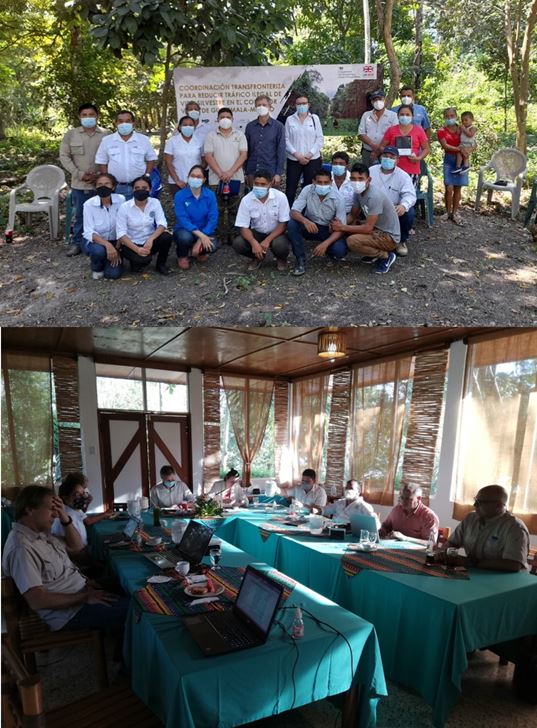 1.We received two visits from UK Ambassador to Guatemala, Mr. Nick Whittingham, during the project period within the Department of Petén, where he was received an update regarding project advances, as well as visiting San Miguel la Palotada, a rural beneficiary community managing one of the focal areas of the IWT076 project where partners implemented new approaches to increase sustainable economic alternatives for the population affected by wildlife trafficking, including forest restoration projects, beekeeping and poultry ranching.
1.We received two visits from UK Ambassador to Guatemala, Mr. Nick Whittingham, during the project period within the Department of Petén, where he was received an update regarding project advances, as well as visiting San Miguel la Palotada, a rural beneficiary community managing one of the focal areas of the IWT076 project where partners implemented new approaches to increase sustainable economic alternatives for the population affected by wildlife trafficking, including forest restoration projects, beekeeping and poultry ranching.
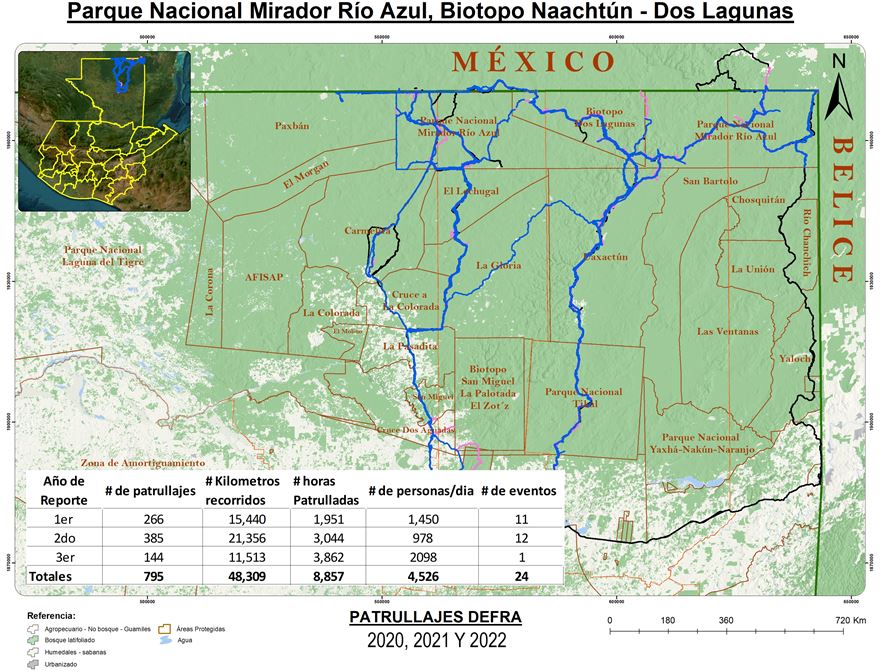 2. We increased the inter-institutional field presence within the focal areas of the project through 890 patrols, 795 in Guatemala and 95 in Mexico; the main objective of these patrols consisted of detecting threats and counteracting the looting of high-value timber. Patrols resulted in the capture of 9 wildlife traffickers, including 7 Mexican timber poachers; project partners, led by FUNADECO, CECON, and CONAP successfully repelled timber traffickers from entering the target areas for 22 months (i.e., within Mirador-Rio Azul National Park and Biotopo Naachtún Dos Lagunas). During Year 1 of the project, we also expanded the project focal area to include the El Zotz Biotope, supporting CECON’s ability to patrol the area.
2. We increased the inter-institutional field presence within the focal areas of the project through 890 patrols, 795 in Guatemala and 95 in Mexico; the main objective of these patrols consisted of detecting threats and counteracting the looting of high-value timber. Patrols resulted in the capture of 9 wildlife traffickers, including 7 Mexican timber poachers; project partners, led by FUNADECO, CECON, and CONAP successfully repelled timber traffickers from entering the target areas for 22 months (i.e., within Mirador-Rio Azul National Park and Biotopo Naachtún Dos Lagunas). During Year 1 of the project, we also expanded the project focal area to include the El Zotz Biotope, supporting CECON’s ability to patrol the area.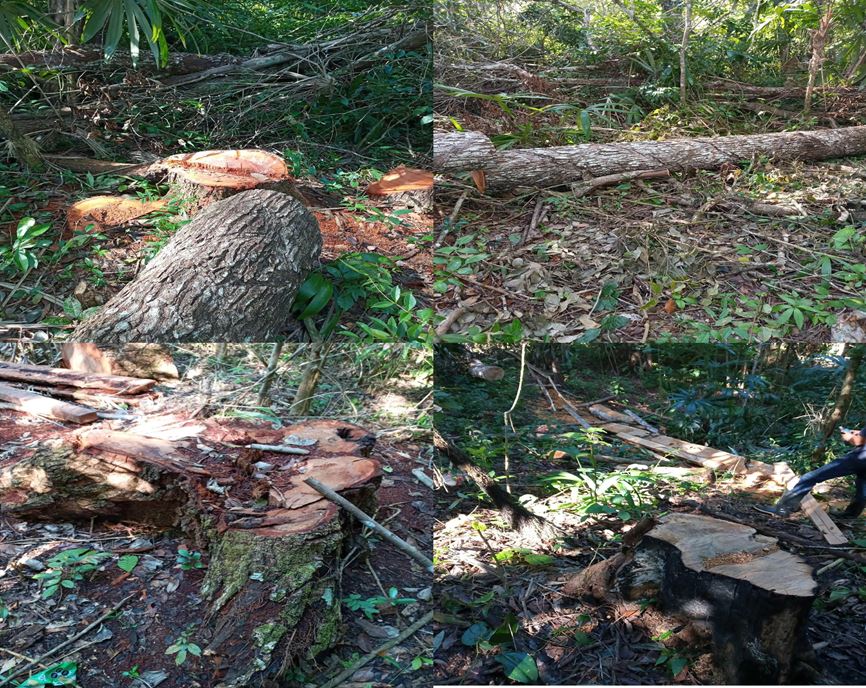
3. The control and surveillance patrols carried out during the project period resulted in a decrease of - 91.2% in the number of wildlife trafficking events in Guatemala, and a decrease of -62.7% in the number of wildlife trafficking events in Mexico.
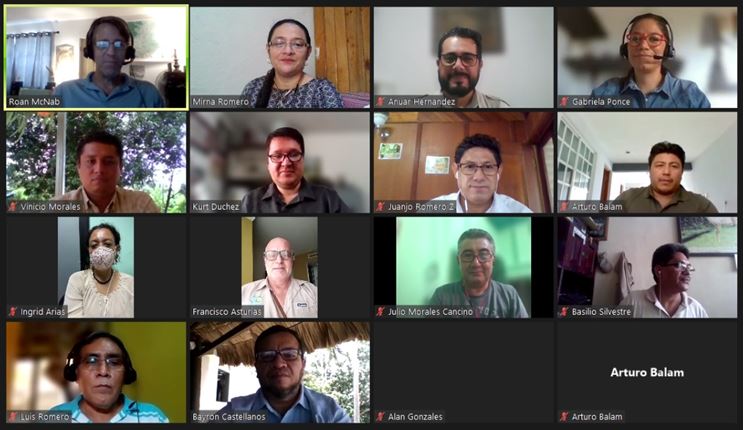 4. Partners held 35 meetings of the Guatemala-Mexico Binational IWT Network to coordinate the activities carried out during the project's execution, laying the foundations for lasting, long-term cooperation.
4. Partners held 35 meetings of the Guatemala-Mexico Binational IWT Network to coordinate the activities carried out during the project's execution, laying the foundations for lasting, long-term cooperation.
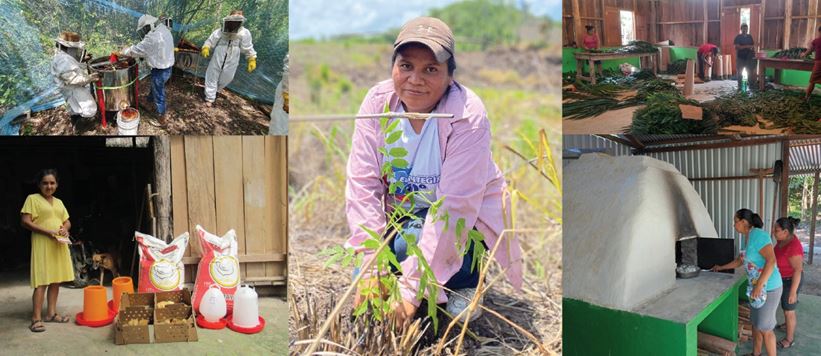 5. We implemented small scale projects to increase sustainable economic alternatives prioritized by local experts, national authorities, and community representatives, including beekeeping, harvesting of non-timber forest products, forest restoration and agroforestry, and poultry ranching. We initially focused support on 107 households across 5 management units, with a focus on families in vulnerable communities or those exposed to illegal trafficking of flora and fauna within the Maya Biosphere Reserve of Guatemala. By the end of 2.5 years of implementation, we supported 231 families in total, with 35% of the local beneficiaries being female.
5. We implemented small scale projects to increase sustainable economic alternatives prioritized by local experts, national authorities, and community representatives, including beekeeping, harvesting of non-timber forest products, forest restoration and agroforestry, and poultry ranching. We initially focused support on 107 households across 5 management units, with a focus on families in vulnerable communities or those exposed to illegal trafficking of flora and fauna within the Maya Biosphere Reserve of Guatemala. By the end of 2.5 years of implementation, we supported 231 families in total, with 35% of the local beneficiaries being female.
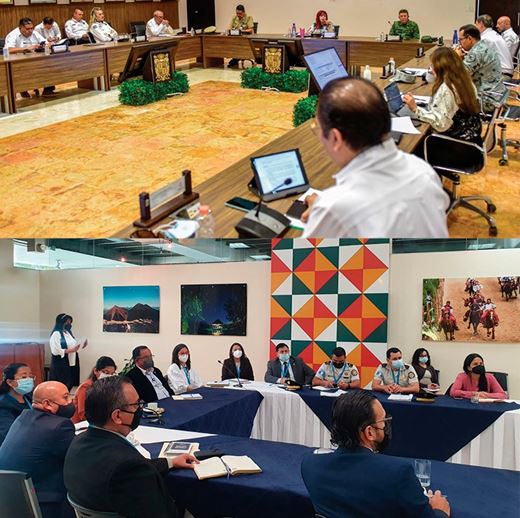 6. During the implementation of the project "Transboundary Coordination to Reduce Illegal Wildlife Trafficking in the Guatemala-Mexico Green Corridor", partners engaged Guatemala’s Ministry of Foreign Affairs (MINEX), requesting their support to engage high-level authorities in both countries and to set the stage for future coordination on IWT by the Security Roundtable of the Government of Guatemala; In the case of Mexico, our lead implement partner, Pronatura Península Yucatan, presented DEFRA-IWT project activities within the State of Campeche, led by the Governor of Campeche, Mrs. Layda Sansores, including seven events that helped increase local attention to wildlife trafficking in the Guatemala-Mexico Green Corridor.
6. During the implementation of the project "Transboundary Coordination to Reduce Illegal Wildlife Trafficking in the Guatemala-Mexico Green Corridor", partners engaged Guatemala’s Ministry of Foreign Affairs (MINEX), requesting their support to engage high-level authorities in both countries and to set the stage for future coordination on IWT by the Security Roundtable of the Government of Guatemala; In the case of Mexico, our lead implement partner, Pronatura Península Yucatan, presented DEFRA-IWT project activities within the State of Campeche, led by the Governor of Campeche, Mrs. Layda Sansores, including seven events that helped increase local attention to wildlife trafficking in the Guatemala-Mexico Green Corridor.
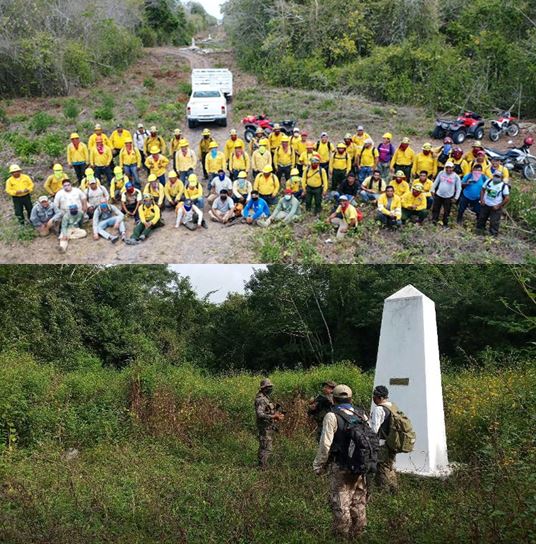 7. We facilitated binational exchanges between field staff and national government partners from Guatemala and Mexico; During the project we strengthened cooperation through increased bilateral presence within the Green Corridor, for example through 4 control and surveillance park guard exchanges between government authorities (CONAP, CONANP, SEMABICCE, and project partners) as well as implementing multiple joint patrols along the Guatemala-Mexico frontier. During 2020, partners also quashed a forest fire along the frontier, engaging the authorities of Guatemala and Mexico around Arroyo Ne
7. We facilitated binational exchanges between field staff and national government partners from Guatemala and Mexico; During the project we strengthened cooperation through increased bilateral presence within the Green Corridor, for example through 4 control and surveillance park guard exchanges between government authorities (CONAP, CONANP, SEMABICCE, and project partners) as well as implementing multiple joint patrols along the Guatemala-Mexico frontier. During 2020, partners also quashed a forest fire along the frontier, engaging the authorities of Guatemala and Mexico around Arroyo Ne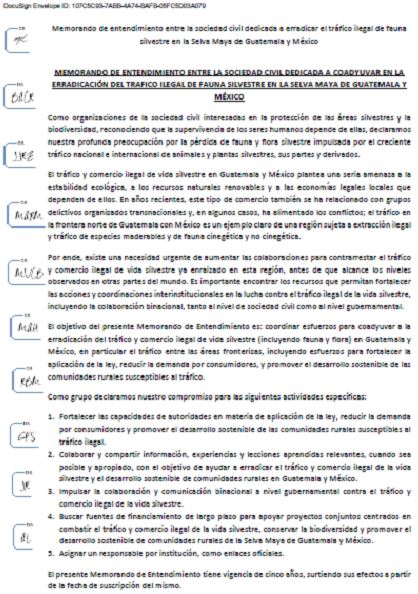 gro.
gro.
8. IWT partners signed a memorandum of understanding between civil society organizations dedicated to eradicating illegal wildlife trafficking in the Maya Forest of Guatemala and Mexico, including 8 organizations from Guatemala and 5 from Mexico.
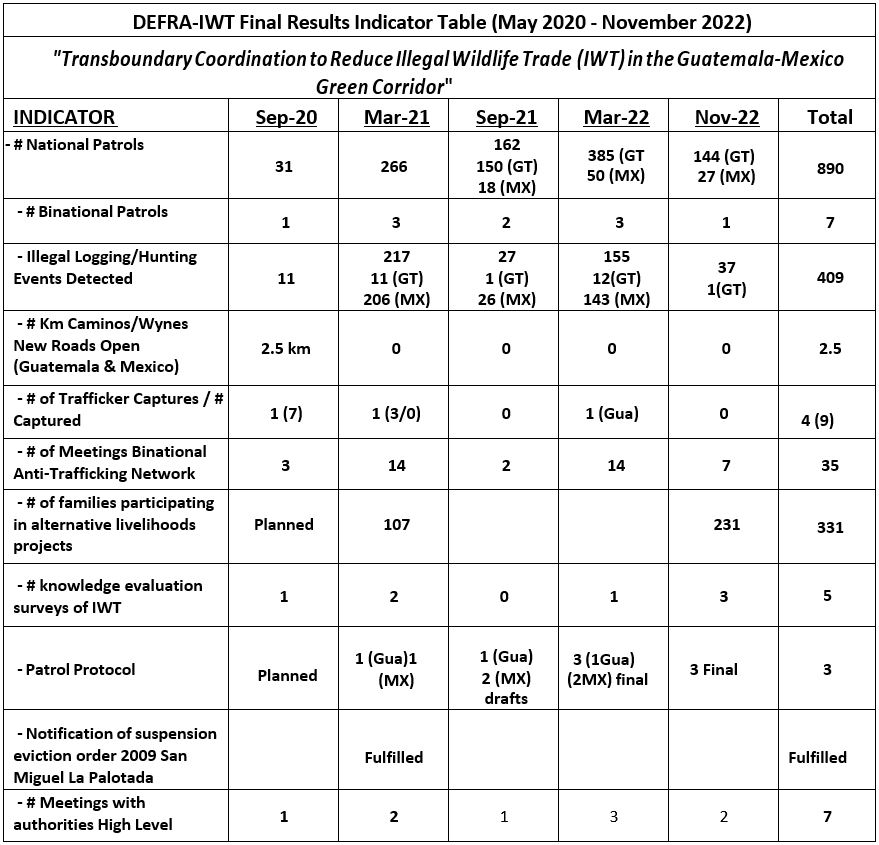
IWT076 White Paper - Lessons Learned Recommendations_ENG. August 2023
